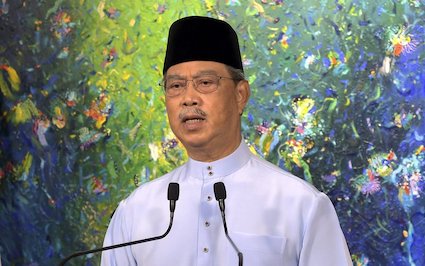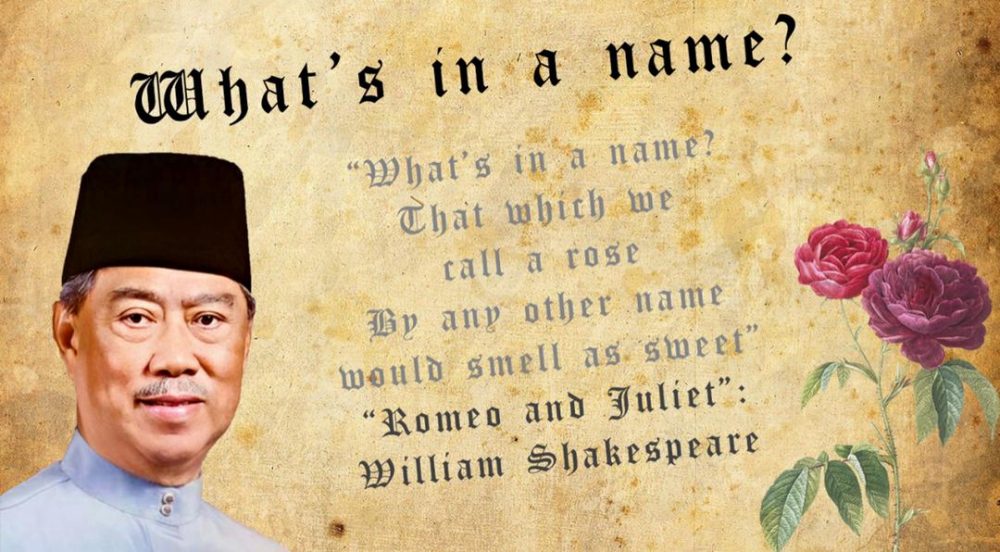Muhyiddin, Mahiaddin, what’s in a name?

An education for those who obsess over the prime minister’s name without knowing the proper historical and cultural context.
Abdar Rahman Koya, Malaysia Now
Ever since the Prime Minister’s Office issued a circular to explain the format of Muhyiddin Yassin’s name, some of his political enemies have resorted to mocking it, preferring instead to use “Mahiaddin”, which is how his name is spelt in his birth certificate.
While it provides a necessary distraction from more serious issues, the truth is that it reflects an ignorance of one of the realities of Malaysian life.
Like any non-Western language which switched to the Roman alphabet in the aftermath of colonisation, the Malay language suffered from a lack of standardisation to correctly denote its pronunciation, especially for borrowed foreign words and names.
The Arabic language is to this day written in the Arabic script, and so the Arabic speaking world was largely shielded from the onslaught of romanisation.
But that was not the case with languages which adopted a large number of Arabic words in their vocabularies.
Even the English language had difficulty transliterating Arabic terms, and the problem became more apparent as Arabic and Islamic literature began to be translated into English.
It was not until a few decades back that a more serious attempt at standardising the romanised format of Arabic terms was initiated in the US, as the corpus of Islamic publications in the English language multiplied alongside the number of Muslims born in the West who habitually read and write English as their first language.

In Malaysia, similar attempts were made through the establishment of Dewan Bahasa dan Pustaka, considered the authority on the national language. Over the years, the problem of non-standardised spelling, including of Arabic terms which have a huge influence on Bahasa Malaysia, was minimised.
However, that was not the case with special nouns in Arabic which are commonly used worldwide in the naming of Muslim children. Even the name of the central icon of Islam, Prophet Muhammad, is used in a variety of formats in the Muslim world: for example Mehmet and Muhammet in Turkey, Mohamad in Indonesia and Malaysia, and Mohammed in the Indian subcontinent.
It is obvious that the non-Arabic tongue played a part in the emergence of these variations.
But while variations are tolerated, there are instances, such as the case of “Mahiaddin”, in which the pronunciation for the intended word was totally lost.
Anybody with a basic working knowledge of the Arabic language would guess that the spelling “Mahiaddin” was intended for the more commonly known name “Muhyiddin”, and that it was the result of a lack of standard guidelines for transliteration into Roman letters.
Muhyiddin, a combination of the Arabic terms Muhy (life giver) and Din (religion), correctly reflects the pronunciation of the word.
On the other hand, “Mahiaddin” has no meaning. It is only natural that any one carrying such a burden on their identity would like to set the record straight, more so if the person is someone who has to travel the world and whose name is splattered all over the media.
The recent clarification of Muhyiddin’s name should be seen in this context. It is therefore petty, indeed bordering on primary school behaviour, for anyone to resort to this when confronting the prime minister over a life-and-death issue such as the Covid-19 crisis.
It is not about hiding one’s true identity, and far less about adopting a “glamour name”. And to say it is a “glamour name” only reflects a deep ignorance of contemporary Malay Muslim culture, because the name “Muhyiddin” is probably among the least glamorous names, unlike many Persian and Turkish names tweaked beyond recognition which have become the preference for younger generation Muslim parents instead of the simple traditional Muslim names we grew up with.
There is nothing to lose in calling someone by the name with which he wishes to be called. It’s the least civil thing we can do.
But today, there are politicians who litter their statements and social media posts with the word “Mahiaddin”.
In doing so, they not only show their ignorance of language and history, but also prove that they are in the category of “small minds” who talk about people instead of ideas and issues.
Abdar Rahman Koya is CEO and editor of MalaysiaNow.
https://www.malaysianow.com/opinion/2021/06/18/muhyiddin-mahiaddin-whats-in-a-name/?utm_source=Telegram&utm_medium=Social

